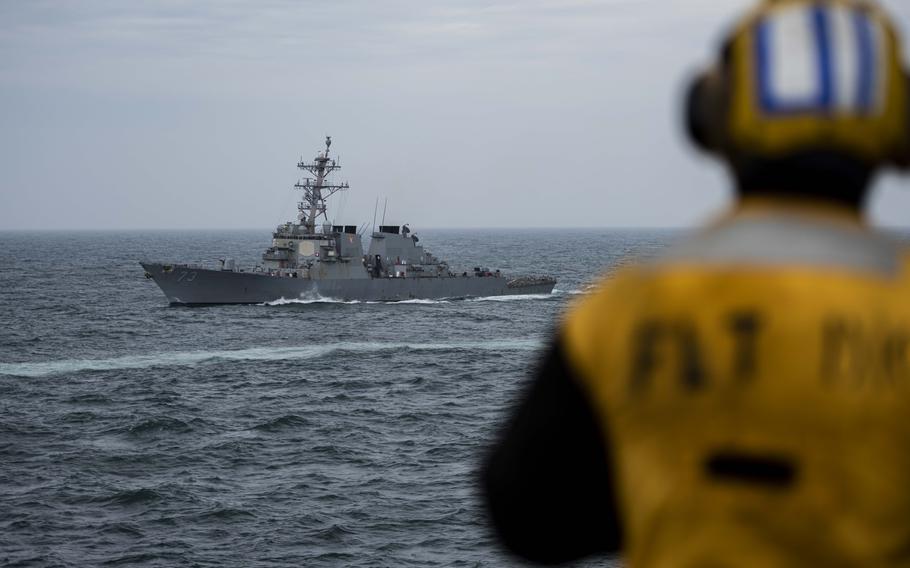
The Arleigh Burke-class guided missile destroyer USS Decatur steams in formation with the aircraft carrier USS Nimitz during a trilateral photo exercise on April 4, 2023, in the East China Sea. (Kenneth Lagadi/U.S. Navy)
WASHINGTON — A Defense Department official assured lawmakers Tuesday that the recent leak of classified intelligence documents will not affect the U.S. military’s strategy in the Indo-Pacific as it calms allied countries in a region dominated by China.
The department is reaching out to allies and partners to make certain that they are “understanding” the position of the Pentagon as it assists the Justice Department with investigating a “disgraceful, criminal act” that has reverberated around the globe, said Jedidiah Royal, the principal deputy assistant secretary of defense for Indo-Pacific security affairs.
“I do want to be clear on this point: This will not knock us off of our strategy, off of our campaigning approach with integrated deterrence in the Indo-Pacific region,” he said. “It is an exceptionally unfortunate situation that does come with national security consequences, but it will not knock us off our approach.”
Royal made the comments during a House Armed Services Committee hearing on military operations in the Indo-Pacific, the most strategically important theater for American troops as China seeks to challenge the U.S.-led world order.
An Air Force National Guard airman is accused of leaking classified intelligence documents that revealed tactical information about the war in Ukraine as well as embarrassing evidence of the U.S. spying on its allies.
One of the disclosures showed the U.S. had eavesdropped on a conversation involving national security officials in South Korea, a key U.S. partner in the region that also hosts multiple American military bases. A South Korean presidential official said last week that the country plans to discuss with the U.S “issues raised” because of the leak.
Royal did not specifically refer to South Korea in his testimony Tuesday but said the Defense Department is conducting “outreach” with friends in the region.
“It's very serious, the department is taking it with the highest degree of seriousness,” he said. “We, every single day, have a responsibility to protect information and make sure that our classified information remains ours.”
Gen. Paul LaCamera, commander of U.S. forces in South Korea, described the U.S.-South Korea relationship Tuesday as a “center of gravity” for deterring the totalitarian North Korean regime and said strengthening the alliance was one of his top priorities.
Adm. John Aquilino, commander of Indo-Pacific Command, said he is seeking to build a network of like-minded nations in the region that will stand as a bulwark against aggression by China and North Korea. The U.S. has regional treaty alliances with Japan, South Korea, the Philippines, Australia and Thailand and is looking to pull in additional allies through military exercises and other engagements.
U.S. troops perform exercises with Indonesia, Malaysia and other countries in the region about 120 times per year, Aquilino said. About 60% of the U.S. maritime force is stationed in the Indo-Pacific.
“It’s an asymmetric advantage because it’s the one thing that China doesn’t have, and that’s partners,” he said.
Rep. Adam Smith of Washington, the top Democrat on the committee, said it was necessary to deepen relationships with countries such as India and Vietnam to contain the threat from China and its burgeoning connection with Russia. India, the world’s largest democracy, has traditionally relied on Russia as its arms supplier and has ramped up imports of Russian oil after Western sanctions led to steep cuts in the price of crude.
Aquilino said the U.S. continues to cooperate with India through military exercises and has provided the country, which he called a “critical partner,” with cold weather gear and other capabilities. The U.S is also helping India develop a defense industrial base that in the future could produce components for planes and helicopters, he said.
“That is expanding the partnership and moving them towards certainly self-sufficiency and increased partnership with the United States,” Aquilino said.